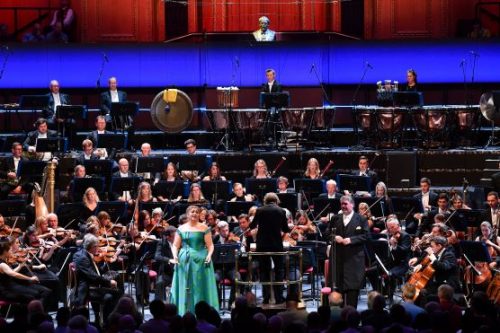
 United Kingdom BBC Prom 68 – Wagner Night: Christine Goerke (soprano), Stephen Gould (tenor), Royal Philharmonic Orchestra / Marc Albrecht (conductor). Royal Albert Hall, London, 9.9.2019. (JPr)
United Kingdom BBC Prom 68 – Wagner Night: Christine Goerke (soprano), Stephen Gould (tenor), Royal Philharmonic Orchestra / Marc Albrecht (conductor). Royal Albert Hall, London, 9.9.2019. (JPr)

Weber – Der Freischütz – overture
César Franck – Le chasseur maudit
Wagner – Forest Murmurs (Siegfried); Götterdämmerung – Dawn and Siegfried’s Rhine Journey; Duet ‘Zu neuen Taten, teurer Helde’; Siegfried’s Death and Funeral Music; Brünnhilde’s Immolation Scene
In a recent review click here I returned to an occasional topic of mine over many years, that of the Wagner Götterdämmerung ‘bleeding chunk’ problem. After dawn breaks, often with undue haste, there are those few moments from Siegfried and Brünnhilde’s Act I duet before our ‘hero’ speeds off down the Rhine in double quick time. This morphs awkwardly into Siegfried’s Death and Funeral Music and then we get part (or all) of the Immolation Scene through to the incandescent end of the opera. The last time I listened to this – in Vienna’s Musikverein where in March 1875 Wagner himself conducted music from Götterdämmerung for the first time in public – it was these familiar extracts I heard, as ever. I mused then how the only voices I heard were in my head and I was thinking about all the great Siegfrieds and Brünnhildes I have heard over the past forty years. The best way to hear these Götterdämmerung excerpts is indeed to have them sung, and for the first time I can remember – at least live – I had my wish.
If one brief moment can encapsulate the remarkable virtuosity of the Royal Philharmonic Orchestra throughout this entire BBC Prom – advertised as a ‘Wagner Night’ – it was the note-perfect horn call for Siegfried’s Rhine Journey which totally defeated a Viennese counterpart. All sections of the orchestra deserve praise with strings, woodwind, brass and percussion the equal of the Vienna Philharmonic heard under Bernard Haitink at the Proms recently (review click here). No one deserves to be particularly singled out but – if pressed – I would like to highlight the excellent contributions of two further musicians during the concert, John Roberts (oboe) and Emer McDonough (flute).
The conductor Marc Albrecht did his best to smooth over the cracks between the different Götterdämmerung episodes though there was an unfortunate musical blip at the opening of the concluding scene (Schussszene). This can be easily overlooked and Albrecht showed – in the venue where Wagner conducted his own music in 1877 – how he has a deep understanding of German Romanticism and rarely can the RPO have sounded better at the Proms in recent years. From the exquisite opening through the thudding Funeral Music to the redemptive ending there was ‘interpretative broadness’ – a phrase I used in the Vienna review – in Albrecht’s approach to the Wagner that probably would not have worked as well in the opera house. This clearly supported his soprano, Christine Goerke, who might have found herself overwhelmed by any orchestra let off the leash to bring more visceral impact to Wagner’s compendium of leitmotifs as the music drama culminates in the return of the ring to the Rhinemaidens, breaking the curse which is the crux of the Ring cycle.
Next summer Goerke and her Siegfried, American compatriot Stephen Gould, will sing their roles at Bayreuth in the final opera of their new Ring. Here Gould proved a forthright Siegfried revealing plenty of his trademark heroic tone during the duet, as well as, vocal subtlety to Siegfried’s poignant demise. Goerke has garnered much praise for her portrayal of Brünnhilde recently and this was the first time I have heard her live. The first Wagnerian soprano I heard at the Proms was Birgit Nilsson in September 1981 (38 years and one day ago!) and certainly Goerke is not Nilsson. The voice is pinched and a little unruly at the top and sometimes vanishes into her chest at the bottom. On this hearing her soprano sounded more lyric than convincingly dramatic and therefore better suited to Elisabeth (Tannhäuser) or Sieglinde (Die Walküre) than Brünnhilde. Nevertheless, Goerke got through the Immolation Scene and was dramatically credible; her best section was the quieter – and less vocally undemanding – few lines ‘Alles, Alles, Alles weiss ich (to) Ruhe, ruhe, du Gott!’ and here Goerke brought an intriguing reflective intimacy to this short passage.
In this so-called ‘Wagner Night’ the only other piece by Wagner that was heard was the Forest Murmurs cleaved from Götterdämmerung Act II and played in the first half (when the Siegfried Idyll would have much more appropriate). Once again those who know the opera can ‘hear’ the voices of Siegfried and his Woodbird at the conclusion of this act. The Forest Murmurs predates (musical) Impressionism from the initial evocative strings, through the various themes relating to Siegfried’s past history, and followed by the Woodbird’s advice (flute doubled by glockenspiel). This all finished by exuberantly sending the young hero off to Brünnhilde’s mountaintop as Albrecht and the RPO ended these few compelling minutes with a joyous flourish.
Forest Murmurs was bookended by the overture from Der Freischütz and César Franck’s Le chasseur maudit (‘The Accursed Huntsman’). It is widely acknowledged that no single operatic composer influenced Richard Wagner as decisively as Carl Maria von Weber and César Franck’s music was strongly influenced by his contemporaries Wagner, as well as, Franz Liszt. Weber tells us that his overture depicts the two central elements in his opera: ‘the life of the hunter and the rule of demonic powers’ and this Albrecht and his accomplished orchestra illuminated vividly. A sumptuous sound from the RPO heard particularly here was very much the highlight of this Prom and for Franck’s Le chasseur maudit Albrecht very skilfully balanced refinement with drama as – following the outline of the Gottfried Bürger’s 18th-century German ballad on which it is based – the huntsman sets off on his ride to damnation.
Jim Pritchard

Utterances such as ‘The first Wagnerian soprano I heard at the Proms was Birgit Nilsson in September 1981 (38 years and one day ago!) and certainly Goerke is not Nilsson’ pretty much disqualify anyone as a serious critic in my view. It’s like saying that apples aren’t as good as pears, or chalk as good as cheese.
As ever – well mostly! – I appreciate all comments to S&H.
Actually having heard Nilsson live, as well as, almost every other leading Brünnhilde during more than 40 years does, I believe, allow me to make some comment based on listening experience. I have never wanted to be ‘a serious critic’ if it means not telling the truth and thereby suggesting that everything was wonderful when it wasn’t.
I have trouble with the logic of this comment because if I ask for apples and cheese I do not want pears and chalk.
Brünnhildes and Siegfrieds are an endangered species these days and voices that in former years would not be considered at all ideal for these roles are now singing them. Brünnhilde should be a role for a genuine ‘Wagnerian soprano’ (powerful with a rich tone and an even quality through all the registers) of which Nilsson is but one example and not just a ‘dramatic soprano’ as familiar from more Italianate roles.
“Actually having heard Nilsson live” on many occasions from the late 1960s to her last performances in the 1980s has made me appreciate what almost every other Brünnhilde brings to the part, and some of what made Nilsson unique.
Back then the dearth of great Siegfrieds was also a problem. But today there are at least three good ones around and at least one who provides the visceral thrill that’s like a throwback to the good old days.